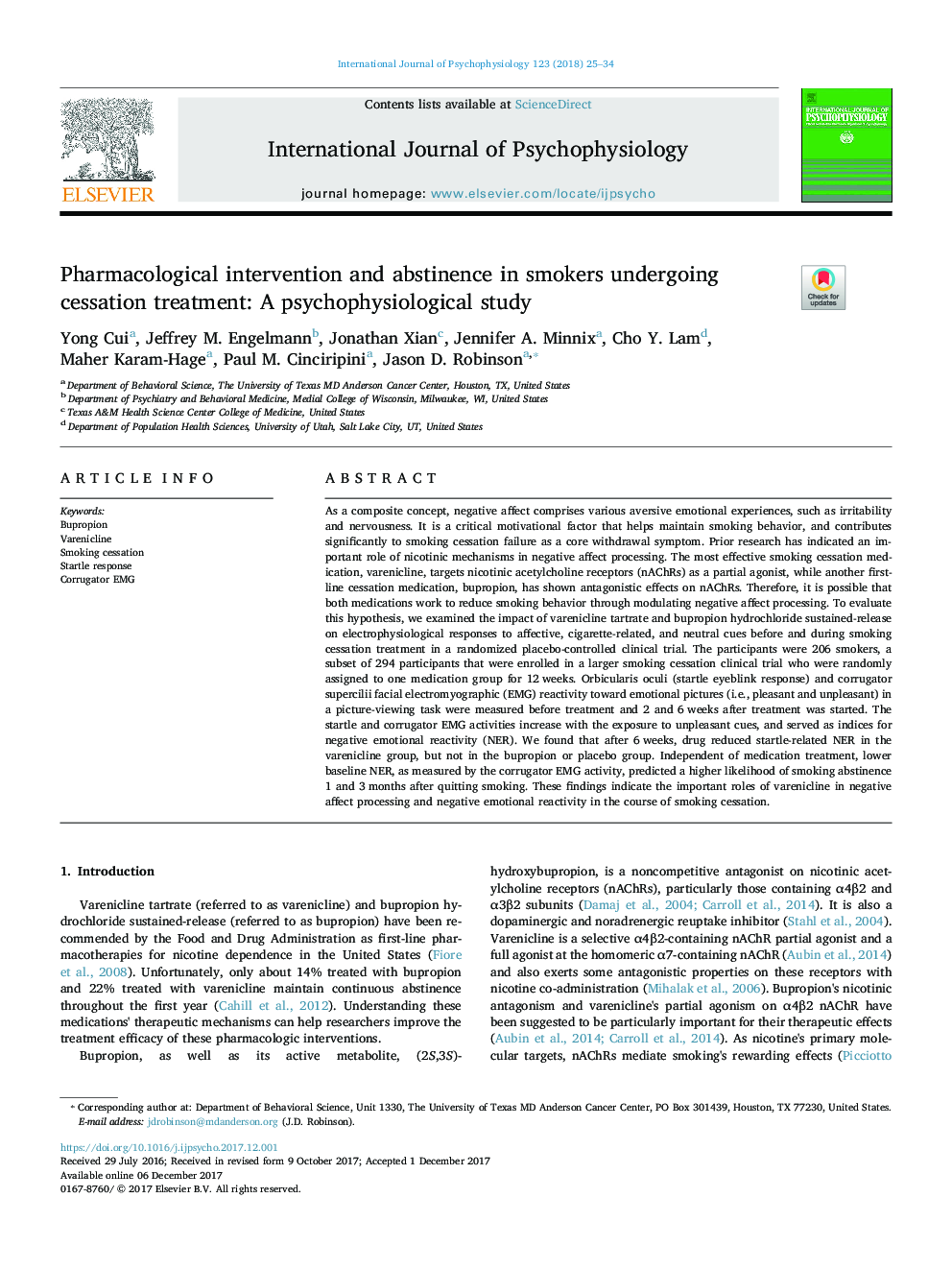| کد مقاله | کد نشریه | سال انتشار | مقاله انگلیسی | نسخه تمام متن |
|---|---|---|---|---|
| 7294906 | 1474373 | 2018 | 10 صفحه PDF | دانلود رایگان |
عنوان انگلیسی مقاله ISI
Pharmacological intervention and abstinence in smokers undergoing cessation treatment: A psychophysiological study
ترجمه فارسی عنوان
مداخله فارماکولوژیک و رعایت سکسکه در افراد سیگاری تحت درمان با درمان: یک مطالعه روانپزشکی
دانلود مقاله + سفارش ترجمه
دانلود مقاله ISI انگلیسی
رایگان برای ایرانیان
کلمات کلیدی
موضوعات مرتبط
علوم زیستی و بیوفناوری
علم عصب شناسی
علوم اعصاب رفتاری
چکیده انگلیسی
As a composite concept, negative affect comprises various aversive emotional experiences, such as irritability and nervousness. It is a critical motivational factor that helps maintain smoking behavior, and contributes significantly to smoking cessation failure as a core withdrawal symptom. Prior research has indicated an important role of nicotinic mechanisms in negative affect processing. The most effective smoking cessation medication, varenicline, targets nicotinic acetylcholine receptors (nAChRs) as a partial agonist, while another first-line cessation medication, bupropion, has shown antagonistic effects on nAChRs. Therefore, it is possible that both medications work to reduce smoking behavior through modulating negative affect processing. To evaluate this hypothesis, we examined the impact of varenicline tartrate and bupropion hydrochloride sustained-release on electrophysiological responses to affective, cigarette-related, and neutral cues before and during smoking cessation treatment in a randomized placebo-controlled clinical trial. The participants were 206 smokers, a subset of 294 participants that were enrolled in a larger smoking cessation clinical trial who were randomly assigned to one medication group for 12Â weeks. Orbicularis oculi (startle eyeblink response) and corrugator supercilii facial electromyographic (EMG) reactivity toward emotional pictures (i.e., pleasant and unpleasant) in a picture-viewing task were measured before treatment and 2 and 6Â weeks after treatment was started. The startle and corrugator EMG activities increase with the exposure to unpleasant cues, and served as indices for negative emotional reactivity (NER). We found that after 6Â weeks, drug reduced startle-related NER in the varenicline group, but not in the bupropion or placebo group. Independent of medication treatment, lower baseline NER, as measured by the corrugator EMG activity, predicted a higher likelihood of smoking abstinence 1 and 3Â months after quitting smoking. These findings indicate the important roles of varenicline in negative affect processing and negative emotional reactivity in the course of smoking cessation.
ناشر
Database: Elsevier - ScienceDirect (ساینس دایرکت)
Journal: International Journal of Psychophysiology - Volume 123, January 2018, Pages 25-34
Journal: International Journal of Psychophysiology - Volume 123, January 2018, Pages 25-34
نویسندگان
Yong Cui, Jeffrey M. Engelmann, Jonathan Xian, Jennifer A. Minnix, Cho Y. Lam, Maher Karam-Hage, Paul M. Cinciripini, Jason D. Robinson,
